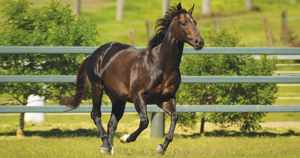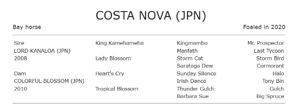Equinome has announced the launch of ‘Checkmate’ a new online tool that checks potential matings in real-time for genomic inbreeding risk. High levels of genomic inbreeding - the amount of double copy DNA in an individual - have recently been linked to mid-to-late term pregnancy loss and lower racing durability in Thoroughbreds. Checkmate is a world-first enabling breeders to reduce the risk of foal loss before a final breeding decision is made.
Click for more information on Checkmate and Equinomelabs.com
The Thoroughbred industry has become increasingly concerned with the range of potential negative health consequences from accelerating levels of inbreeding, both at an individual horse level and for the breed in general. Recently published research led by the Royal Veterinary College (UK) showed an association between higher genomic inbreeding levels and abortions and stillbirths. Pregnancy loss is a critical concern for breeders given the impact of a foal lost late in gestation on the health of the mare and the success of the farm.
High levels of genomic inbreeding have also been shown to significantly impact durability for racing. Published studies led by University College Dublin and Equinome show a clear link between genomic inbreeding and the likelihood of a Thoroughbred horse to ever race.
Checkmate provides real-time predictions of genomic inbreeding in a hypothetical foal by matching the DNA profile of a mare with the genetic profile of up to 10 stallions of the breeder’s choice. Using proprietary bioinformatics algorithms, it calculates the potential impact of each mating on a foal, returning a risk score and flagging high-risk matings.
“The goal with Checkmate is to help our clients protect the health of their mares, reduce the number of lost foals and see more healthy foals progress to the racecourse,” said Professor Emmeline Hill, Chief Science Officer. “The loss of a foal can have a considerable impact on any breeding operation, large or small, but by using genomics to assess inbreeding levels breeders can now reduce unnecessary risks.”
Stallion owners can also use Checkmate to check and manage mare allocation in advance of final breeding decisions. Reducing overall genomic inbreeding in a book of mares can significantly increase the number of live foals, improving both the health of the breed and stallion revenue.
“Using return of mares data, we looked at the relationship between genomic inbreeding and the production of a healthy foal from a mating. In 1000 matings for 28 stallions we found that had Checkmate been used to flag and avoid high risk matings, the percentage of live foals per stallion could be increased from 59% to 76%. Producing more foals would increase stud fee returns for stallions if Checkmate was applied to mare nominations” said Professor Hill.
Checkmate enables broodmare owners and stallion managers to preferentially plan matings with lower inbreeding risk, helping to protect the health of their own horses, increase the chances of a healthy foal and contribute to the long-term sustainability of the Thoroughbred breed.
For more information about Checkmate or to schedule a demonstration, please visit www.equinomelabs.com










